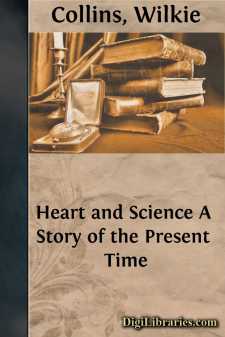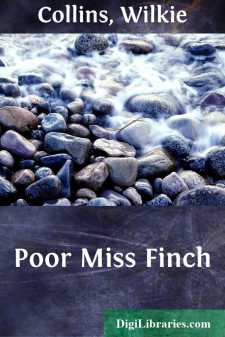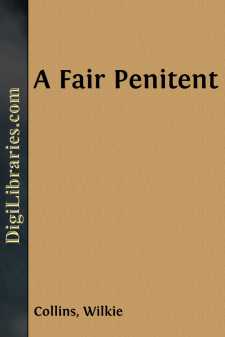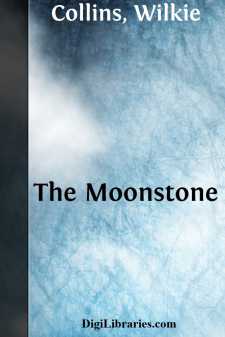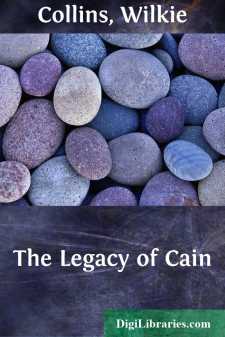Categories
- Antiques & Collectibles 13
- Architecture 36
- Art 48
- Bibles 22
- Biography & Autobiography 813
- Body, Mind & Spirit 142
- Business & Economics 28
- Children's Books 17
- Children's Fiction 14
- Computers 4
- Cooking 94
- Crafts & Hobbies 4
- Drama 346
- Education 46
- Family & Relationships 57
- Fiction 11829
- Games 19
- Gardening 17
- Health & Fitness 34
- History 1377
- House & Home 1
- Humor 147
- Juvenile Fiction 1873
- Juvenile Nonfiction 202
- Language Arts & Disciplines 88
- Law 16
- Literary Collections 686
- Literary Criticism 179
- Mathematics 13
- Medical 41
- Music 40
- Nature 179
- Non-Classifiable 1768
- Performing Arts 7
- Periodicals 1453
- Philosophy 64
- Photography 2
- Poetry 896
- Political Science 203
- Psychology 42
- Reference 154
- Religion 513
- Science 126
- Self-Help 84
- Social Science 81
- Sports & Recreation 34
- Study Aids 3
- Technology & Engineering 59
- Transportation 23
- Travel 463
- True Crime 29
Wilkie Collins
Wilkie Collins was a prominent English novelist and playwright of the Victorian era, best known for pioneering the detective fiction genre with works like "The Woman in White" (1859) and "The Moonstone" (1868). His intricate plots, memorable characters, and innovative narrative techniques significantly influenced contemporary and later literature. Collins was also a close friend of Charles Dickens, with whom he collaborated on several literary projects.
Author's Books:
Sort by:
by:
Wilkie Collins
I. PREFACE TO READERS IN GENERAL You are the children of Old Mother England, on both sides of the Atlantic; you form the majority of buyers and borrowers of novels; and you judge of works of fiction by certain inbred preferences, which but slightly influence the other great public of readers on the continent of Europe. The two qualities in fiction which hold the highest rank in your estimation are:...
more...
by:
Wilkie Collins
A LODGING FOR THE NIGHT, By Robert Louis Stevenson It was late in November, 1456. The snow fell over Paris with rigorous, relentless persistence; sometimes the wind made a sally and scattered it in flying vortices; sometimes there was a lull, and flake after flake descended out of the black night air, silent, circuitous, interminable. To poor people, looking up under moist eyebrows, it seemed a wonder...
more...
by:
Wilkie Collins
CHAPTER THE FIRST You are here invited to read the story of an Event which occurred in an out-of-the-way corner of England, some years since. The persons principally concerned in the Event are:—a blind girl; two (twin) brothers; a skilled surgeon; and a curious foreign woman. I am the curious foreign woman. And I take it on myself—for reasons which will presently appear—to tell the story. So far...
more...
by:
Wilkie Collins
Let me begin by informing you, that this new novel does not present the proposed sequel to my last work of fiction—"The Fallen Leaves." The first part of that story has, through circumstances connected with the various forms of publications adopted thus far, addressed itself to a comparatively limited class of readers in England. When the book is finally reprinted in its cheapest form—then,...
more...
by:
Wilkie Collins
A FAIR PENITENT Charles Pineau Duclos was a French writer of biographies and novels, who lived and worked during the first half of the eighteenth century. He prospered sufficiently well, as a literary man, to be made secretary to the French Academy, and to be allowed to succeed Voltaire in the office of historiographer of France. He has left behind him, in his own country, the reputation of a lively...
more...
by:
Wilkie Collins
I visited Cornwall, for the first time, in the summer and autumn of 1850; and in the winter of the same year, I wrote this book. At that time, the title attached to these pages was strictly descriptive of the state of the county, when my companion and I walked through it. But when, little more than a year afterwards, a second edition of this volume was called for, the all-conquering railway had invaded...
more...
by:
Wilkie Collins
CHAPTER I. THE SMUGGLED SUPPER. Outside the bedroom the night was black and still. The small rain fell too softly to be heard in the garden; not a leaf stirred in the airless calm; the watch-dog was asleep, the cats were indoors; far or near, under the murky heaven, not a sound was stirring. Inside the bedroom the night was black and still. Miss Ladd knew her business as a schoolmistress too well to...
more...
by:
Wilkie Collins
CHAPTER I In the first part of ROBINSON CRUSOE, at page one hundred and twenty-nine, you will find it thus written: "Now I saw, though too late, the Folly of beginning a Work before we count the Cost, and before we judge rightly of our own Strength to go through with it." Only yesterday, I opened my ROBINSON CRUSOE at that place. Only this morning (May twenty-first, Eighteen hundred and fifty),...
more...
by:
Wilkie Collins
The 10:15 train glided from Paddington May 7, 1847. In the left compartment of a certain first-class carriage were four passengers; of these two were worth description. The lady had a smooth, white, delicate brow, strongly marked eyebrows, long lashes, eyes that seemed to change colour, and a good-sized, delicious mouth, with teeth as white as milk. A man could not see her nose for her eyes and mouth;...
more...
by:
Wilkie Collins
CHAPTER I. THE GOVERNOR EXPLAINS. At the request of a person who has claims on me that I must not disown, I consent to look back through a long interval of years and to describe events which took place within the walls of an English prison during the earlier period of my appointment as Governor. Viewing my task by the light which later experience casts on it, I think I shall act wisely by exercising...
more...


